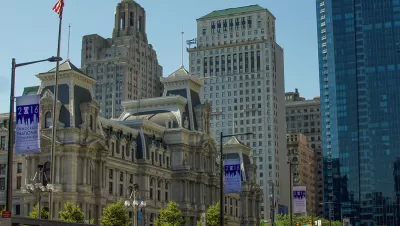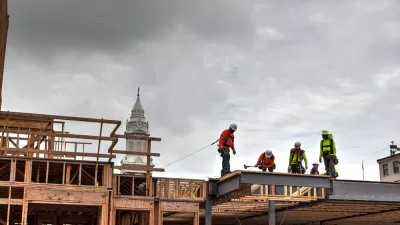Philadelphia's controversial "Mixed-Income Housing Program" legislation has run into stiff resistance from developers and builders.

The city of Philadelphia has hit a roadblock in an attempt to approve a new inclusionary zoning ordinance.
The latest development in the unfolding saga occurred on Monday, when the City Council's Rules Committee postponed a vote on the bill by Councilmember Maria Quiñones-Sánchez until December 5. Jake Blumgart reports that the postponement came after five hours of testimony, with criticism about the bill originating from the development and building industries.
The postponement follows news from last week, also reported by Blumgart, which saw amendments "radically reshape" the bill. Also last week, "[t]he Planning Commission decided the bill needed more work and voted to place a hold on it," reports Blumgart.
Here's how Blumgart describes the changes between the original bill and the bill after the amendments made last week:
The original bill would have required any new development in Philadelphia larger than nine residential units to set aside 10 percent of the units as affordable units. Although a percentage of them could be covered by a payment into the city’s Housing Trust Fund or offered off site, some of the units had to be interspersed throughout the building. That’s why the legislation is described as a “Mixed-Income Housing Program.”
The amendments Sanchez is now offering would change all that. Developers are now allowed to opt out of on-site development completely in exchange for paying into the trust fund. The bill originally would have covered the entire city, offering different affordability limits in Center City and the rest of town. But now the bill only applies to high-density zoning districts (RM-4, RMX-3, CMX-3, CMX-4, and CMX-5), which are concentrated in Center City, University City, and along a few major thoroughfares in other neighborhoods.
After the City Council's Rule Committee hearing earlier this week, Councilmember Maria Quiñones-Sánchez is quoted saying that there isn't any new information that is likely to change the position of any interested participants in the debate.
FULL STORY: Hold the zone: Vote on inclusionary zoning delayed a week in wake of opposition

Alabama: Trump Terminates Settlements for Black Communities Harmed By Raw Sewage
Trump deemed the landmark civil rights agreement “illegal DEI and environmental justice policy.”

Study: Maui’s Plan to Convert Vacation Rentals to Long-Term Housing Could Cause Nearly $1 Billion Economic Loss
The plan would reduce visitor accommodation by 25% resulting in 1,900 jobs lost.

Planetizen Federal Action Tracker
A weekly monitor of how Trump’s orders and actions are impacting planners and planning in America.

Grand Rapids Mayor Proposes Garage Conversion Plan
The mayor says allowing homeowners to convert garages to dwelling units could alleviate the city’s housing shortage.

Baltimore Ordered to Improve Sidewalk Accessibility
The city is one of many to face lawsuits for failing to comply with the Americans with Disabilities Act.

This Toronto Suburb Has More Bus Riders Than Columbus, Ohio
Brampton, Ontario used gradual improvements in service to prove that if you build it, they will ride.
Urban Design for Planners 1: Software Tools
This six-course series explores essential urban design concepts using open source software and equips planners with the tools they need to participate fully in the urban design process.
Planning for Universal Design
Learn the tools for implementing Universal Design in planning regulations.
Smith Gee Studio
Alamo Area Metropolitan Planning Organization
City of Santa Clarita
Institute for Housing and Urban Development Studies (IHS)
City of Grandview
Harvard GSD Executive Education
Toledo-Lucas County Plan Commissions
Salt Lake City
NYU Wagner Graduate School of Public Service





























